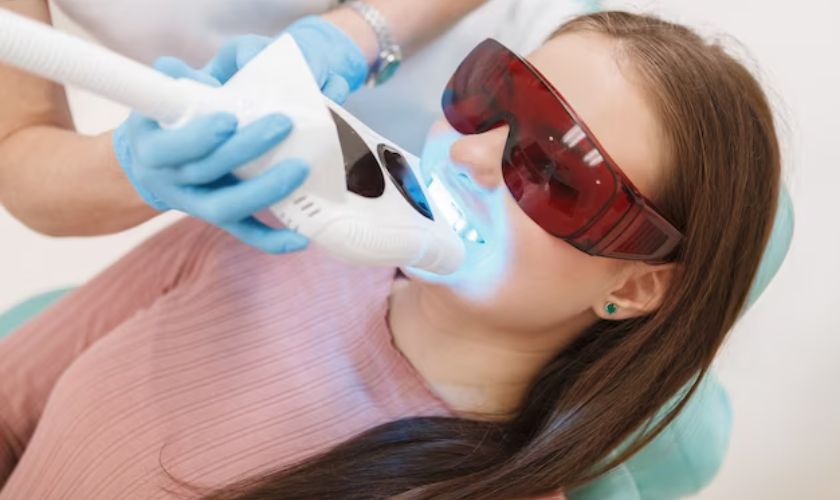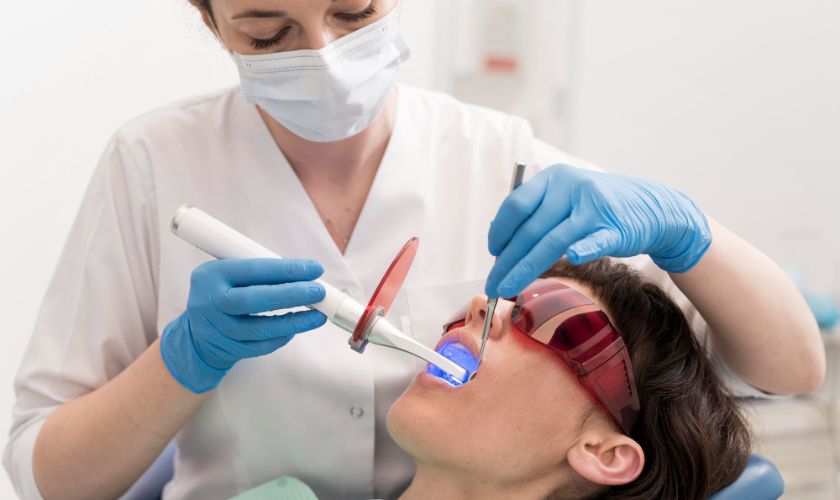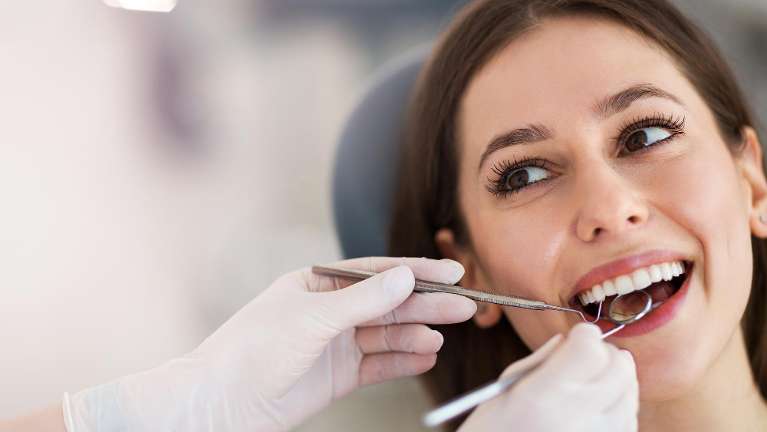
Discover the key factors influencing optimal frequency for professional teeth cleaning. Maintain oral health with informed decisions.Maintaining good oral health is crucial, and professional teeth cleaning plays a significant role in this endeavor. However, determining the ideal frequency for these cleanings involves considering various factors. These include your individual oral hygiene practices, susceptibility to dental issues, medical conditions, lifestyle choices, and even genetic predisposition. While a general guideline suggests biannual cleanings, some individuals might benefit from more frequent visits, especially those prone to plaque buildup or gum problems. Conversely, those with exceptional oral care routines might require fewer visits. By comprehending these factors, you can make informed decisions about how often to schedule professional teeth cleanings for a confident and radiant smile.
General Guidelines for Teeth Cleaning Frequency
1. Biannual Cleanings:
The standard recommendation is to have a professional teeth cleaning every six months. This routine helps prevent the buildup of plaque and tartar, reducing the risk of cavities, gum disease, and other oral health issues. Regular cleanings also allow dentists to catch potential problems early.
2. Individual Oral Health Needs:
Your personal oral hygiene practices and oral health condition play a significant role in determining cleaning frequency. If you consistently maintain good oral care habits, such as thorough brushing and flossing, you might require fewer cleanings. On the other hand, if you struggle with plaque buildup or have a history of dental issues, more frequent cleanings may be necessary.
3. Dentist’s Recommendation:
Your dentist’s expertise is crucial in determining the appropriate cleaning schedule for your specific needs. Dentists assess your oral health, consider factors like medical conditions, lifestyle, and genetics, and provide tailored recommendations. They might suggest more frequent cleanings if they identify a higher risk of problems or extend the interval if your oral health is consistently excellent.
Factors Influencing Cleaning Frequency
A. Individual Oral Hygiene Practices
1. Consistency of Brushing and Flossing:
How regularly and effectively you brush and floss your teeth impacts the need for professional cleanings. If you maintain a diligent routine of brushing twice a day and flossing daily, you might be able to space out your professional cleanings. Proper brushing and flossing help remove plaque and food particles, reducing the risk of buildup between visits.
2. Use of Oral Care Products:
The type of toothbrush, toothpaste, and mouthwash you use can affect your oral health. Using products that are recommended by your dentist, such as fluoride toothpaste or antibacterial mouthwash, can contribute to better oral hygiene. It’s important to follow your dentist’s guidance on using these products for optimal results.
3. Technique and Thoroughness:
The way you brush and floss matters. Using the right technique ensures that you clean all surfaces of your teeth and reach between them effectively. Brushing too hard or using improper brushing techniques can damage your gums and enamel. If you’re unsure about your brushing or flossing technique, your dental hygienist can provide guidance during your professional cleaning appointments.
B. Susceptibility to Dental Issues
1. Plaque and Tartar Buildup:
Individuals vary in their tendency to develop plaque and tartar, which are major contributors to dental problems. Those who are more susceptible to rapid plaque accumulation might require more frequent professional cleanings to prevent the buildup from progressing into more serious issues like cavities or gum disease.
2. Gum Sensitivity and Health:
Some people have gums that are more sensitive or prone to inflammation. This susceptibility can lead to gingivitis or more advanced gum disease. Individuals with such predispositions might need more regular cleanings to manage gum health and prevent the progression of gum disease.
3.Cavity Proneness:
Certain individuals might have a genetic predisposition to cavities due to factors like the structure of their teeth or the composition of their saliva. Regular professional cleanings can help detect and address cavities early, reducing the risk of further decay and the need for more extensive dental work.
C. Medical Conditions and Oral Health
1. Impact of Systemic Diseases:
Certain medical conditions like diabetes, heart disease, autoimmune disorders, and even hormonal imbalances can have direct or indirect effects on oral health. Individuals with these conditions may be more prone to gum disease, dry mouth, and other oral issues. Therefore, they might need more frequent professional cleanings to manage their oral health effectively.
2. Medications and Oral Health:
Many medications can affect oral health by causing dry mouth, changes in saliva composition, or promoting gum problems. These effects can contribute to a higher risk of cavities and gum disease. Individuals taking such medications might require more regular cleanings to mitigate the potential negative impact on their oral health.
3. Collaboration Between Healthcare Providers:
For individuals with complex medical conditions, collaboration between their dentist and other healthcare providers is crucial. Dentists can work alongside physicians to tailor oral care routines and cleaning frequencies that align with the individual’s overall health needs. This approach ensures that oral health doesn’t exacerbate existing medical conditions.
D. Lifestyle Choices
1. Dietary Habits:
What you eat and drink can greatly impact your oral health. Diets high in sugary foods and beverages contribute to the growth of harmful bacteria and increase the risk of cavities. Individuals with diets rich in acidic foods or frequent snacking might also be at higher risk. Such dietary habits might necessitate more frequent professional cleanings to counteract the potential damage.
2. Tobacco and Alcohol Use:
Smoking and tobacco use are linked to various oral health issues, including gum disease, bad breath, and oral cancer. Similarly, excessive alcohol consumption can dry out the mouth and increase the risk of tooth decay. Individuals who smoke, use tobacco, or consume alcohol regularly might need more frequent cleanings to manage the adverse effects on their oral health.
3. Oral Care Practices:
Beyond routine brushing and flossing, certain practices can impact oral health. Grinding teeth (bruxism), using teeth as tools, or improper use of oral hygiene products can cause enamel wear and other problems. Individuals with these habits might require more regular cleanings to address potential damage and maintain optimal oral health.
Signs You Might Need More Frequent Cleanings
1. Bleeding Gums:
If your gums constantly bleed when brushing or flossing, it could be a sign of gum inflammation or gingivitis. Regular bleeding might indicate that plaque and tartar are accumulating along the gumline, requiring more frequent cleanings to prevent the progression of gum disease.
2. Persistent Bad Breath:
Chronic bad breath (halitosis) can be caused by bacteria buildup in the mouth. These bacteria produce foul-smelling compounds. More frequent cleanings can help remove the accumulated bacteria and prevent bad breath.
3. Tartar Buildup:
Even with regular brushing and flossing, some individuals are more prone to tartar buildup than others. If you consistently notice hardened deposits on your teeth, it might be necessary to have more frequent professional cleanings to remove tartar before it leads to cavities or gum issues.
4. Changes in Oral Health Routine:
If you’ve recently experienced changes in your oral health, such as increased sensitivity, pain, or other symptoms, it could be an indication that your oral hygiene routine needs adjustment. Your dentist might recommend more frequent cleanings as part of a targeted plan to address these changes.
Consulting Your Dentist
1. Professional Assessment:
Your dentist is the best source of personalized guidance regarding your oral health needs. They will evaluate your oral hygiene habits, medical history, risk factors, and current oral health status. Based on this assessment, they can recommend the ideal frequency for your professional teeth cleanings.
2. Customized Cleaning Schedule:
Every individual’s oral health needs are unique. Your dentist will take into account factors such as your susceptibility to dental issues, lifestyle choices, and any underlying medical conditions. With this information, they can create a cleaning schedule tailored to your specific requirements.
3. Regular Check-ups for Adjustment:
Dental health can change over time due to various factors. Regular dental check-ups are essential to monitor your oral health and adjust your cleaning frequency as needed. If your oral hygiene practices improve or worsen, or if you experience any changes in your dental health, your dentist can modify your cleaning schedule accordingly.
In determining the frequency of professional teeth cleanings, individual factors reign supreme. From oral hygiene practices to medical conditions, genetics, and lifestyle choices, a tailored approach is vital. Consulting your dentist for personalized recommendations ensures a confident smile and sustained oral well-being.


